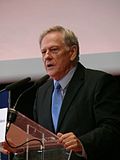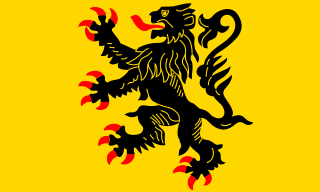
Nord-Pas-de-Calais ; Picard: Nord-Pas-Calés); is a former administrative region of France. Since 1 January 2016, it has been part of the new region Hauts-de-France. It consisted of the departments of Nord and Pas-de-Calais. Nord-Pas-de-Calais borders the English Channel (west), the North Sea (northwest), Belgium and Picardy (south). Until the 17th century, the history of the North was largely in common with the history of Belgium, that of a land that “for almost a thousand years served as a battlefield for all of Europe.” The majority of the region was once part of the historical Southern Netherlands, but gradually became part of France between 1477 and 1678, particularly during the reign of king Louis XIV. The historical French provinces that preceded Nord-Pas-de-Calais are Artois, French Flanders, French Hainaut and (partially) Picardy. These provincial designations are still frequently used by the inhabitants. The former administrative region was created in 1956 under the name "Nord" and maintained that name until 1972 when "Pas-de-Calais" was added. This remained unchanged until its dissolution in 2016.
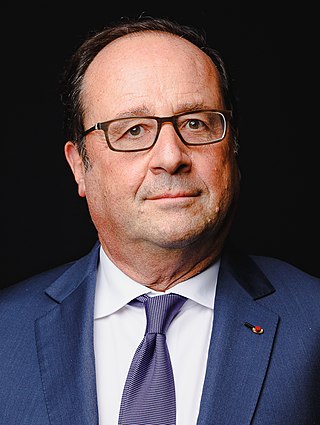
Regional elections in were held in France on 21 and 28 March 2004. At stake were the presidencies of each of France's 26 regions which, although they do not have legislative powers, manage sizeable budgets. The results were a triumph for the parties of the left, led by the French Socialist Party (PS) in alliance with minor parties, including the French Communist Party (PCF), the Left Radical Party (PRG) and The Greens. The left has usually fared moderately well in regional elections, but this was their best result since the regional system was introduced.

Marion Anne Perrine "Marine" Le Pen is a French lawyer and politician who ran for the French presidency in 2012, 2017, and 2022. A member of the National Rally, she served as its president from 2011 to 2021. She has been the member of the National Assembly for the 11th constituency of Pas-de-Calais since 2017. She currently serves as parliamentary party leader of the National Rally in the Assembly, a position she has held since June 2022.
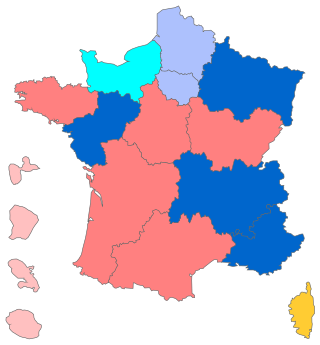
A regional council is the elected assembly of a region of France.

The French municipal elections of 2008 were held on 9 and 16 March to elect the municipal councils of France's 36,782 communes. The first task of each newly constituted municipal council was to elect a mayor.

The Left Front was a French electoral alliance and a political movement created for the 2009 European elections by the French Communist Party and the Left Party when a left-wing minority faction decided to leave the Socialist Party, and the Unitary Left, a group which left the New Anticapitalist Party. The alliance was subsequently extended for the 2010 regional elections and the 2012 presidential election and the subsequent parliamentary election.
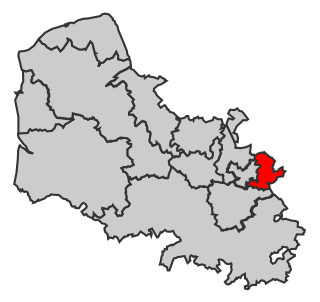
The 11th constituency of the Pas-de-Calais is a French legislative constituency in the Pas-de-Calais département. It elects one député to the National Assembly. It has been represented by Marine Le Pen since 2017.

Regional elections were held in France on 14 and 21 March 2010. At stake were the presidencies of each of France's 26 régions, which, though they do not have legislative autonomy, manage sizable budgets.

Legislative elections were held in France on 10 and 17 June 2012 to select the members of the 14th National Assembly of the Fifth Republic, a little over a month after the presidential election run-off held on 6 May.

Hauts-de-France is the northernmost region of France, created by the territorial reform of French regions in 2014, from a merger of Nord-Pas-de-Calais and Picardy. Its prefecture is Lille. The new region came into existence on 1 January 2016, after regional elections in December 2015. The Conseil d'État approved Hauts-de-France as the name of the region on 28 September 2016, effective the following 30 September.

Steeve Briois is a French politician. In 2017, he was interim leader of the National Front. In 2014, he was elected mayor of Hénin-Beaumont and a member of the European Parliament. From 2011 to 2014, he was general-secretary of the National Front. He was a member of the regional council of Nord-Pas-de-Calais from 1998 to 2014.

Pierre de Saintignon was a French politician. He was a member of the French Socialist Party since 1967. He was elected councilor to the Lille municipality in 1989, 1995, 2001, 2008 and 2014, the first two terms under Pierre Mauroy and the other three under Martine Aubry. From 2001, he was the First Deputy-Mayor, in charge of finance, economic development and military matters. In 1998, 2004 and 2010 he was elected councilor the Regional Council of Nord-Pas-de-Calais, where he sat as first vice-president, in charge of economic development. Most of his political career was as an unofficial chief of staff, rather than as a foreground person. He was chosen to lead the PS list for the 2015 regional elections that were held on 6 and 13 December 2015.

Regional elections were held in France on 6 and 13 December 2015. At stake were the regional councils in metropolitan and overseas France including the Corsican Assembly and inaugural seats in the Assembly of French Guiana and Assembly of Martinique, all for a six-year term. The Departmental Council of Mayotte, which also exercises the powers of a region, was the only region not participating in this election, having already been renewed on 2 April 2015. There were 18 regional presidencies at stake, with 13 in mainland France and Corsica, as well as 5 overseas. Though they do not have legislative autonomy, these territorial collectivities manage sizable budgets. Moreover, regional elections are often taken as a mid-term opinion poll.

Philippe Kemel is a French politician who is the mayor of Carvin and a former member of the National Assembly of France. He is a member of the Socialist Party.

The 2015 Provence-Alpes-Côte d'Azur regional election took place on 6 and 13 December to renew the 123 members of the Regional Council of Provence-Alpes-Côte d'Azur.

The Regional Council of Hauts-de-France is the deliberative assembly of the Hauts-de-France region in Northern France.

The assembly of Martinique is the deliberative assembly of Martinique, which is a single territorial collectivity of France. In 2015 it replaced both the Regional and General Councils of Martinique.
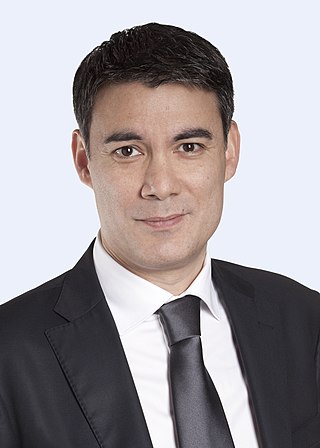
Regional elections were held in France on 20 June and 27 June 2021. At stake were the regional councils in metropolitan and overseas France including the Corsican Assembly, Assembly of French Guiana and Assembly of Martinique, all for a six-year term. The Departmental Council of Mayotte, which also exercises the powers of a region, also participated in this election, because the departmental elections were held at the same time. Eighteen regional presidencies were at stake, with thirteen in mainland France and Corsica, as well as five overseas. Though they do not have legislative autonomy, these territorial collectivities manage sizable budgets. Moreover, regional elections are often perceived as a mid-term opinion poll. Due to the COVID-19 pandemic, the regional and departmental elections were postponed, first to 13 and 20 June 2021 and then to 20 and 27 June 2021.

Mélanie Disdier is a French politician. She has served as an elected municipal councilor in Caudry since 2003 and a regional councillor of Nord-Pas-de-Calais since 2015. She was elected Member of the European Parliament (MEP) during the 2024 European Parliament elections in France. She is a member of the National Rally.



